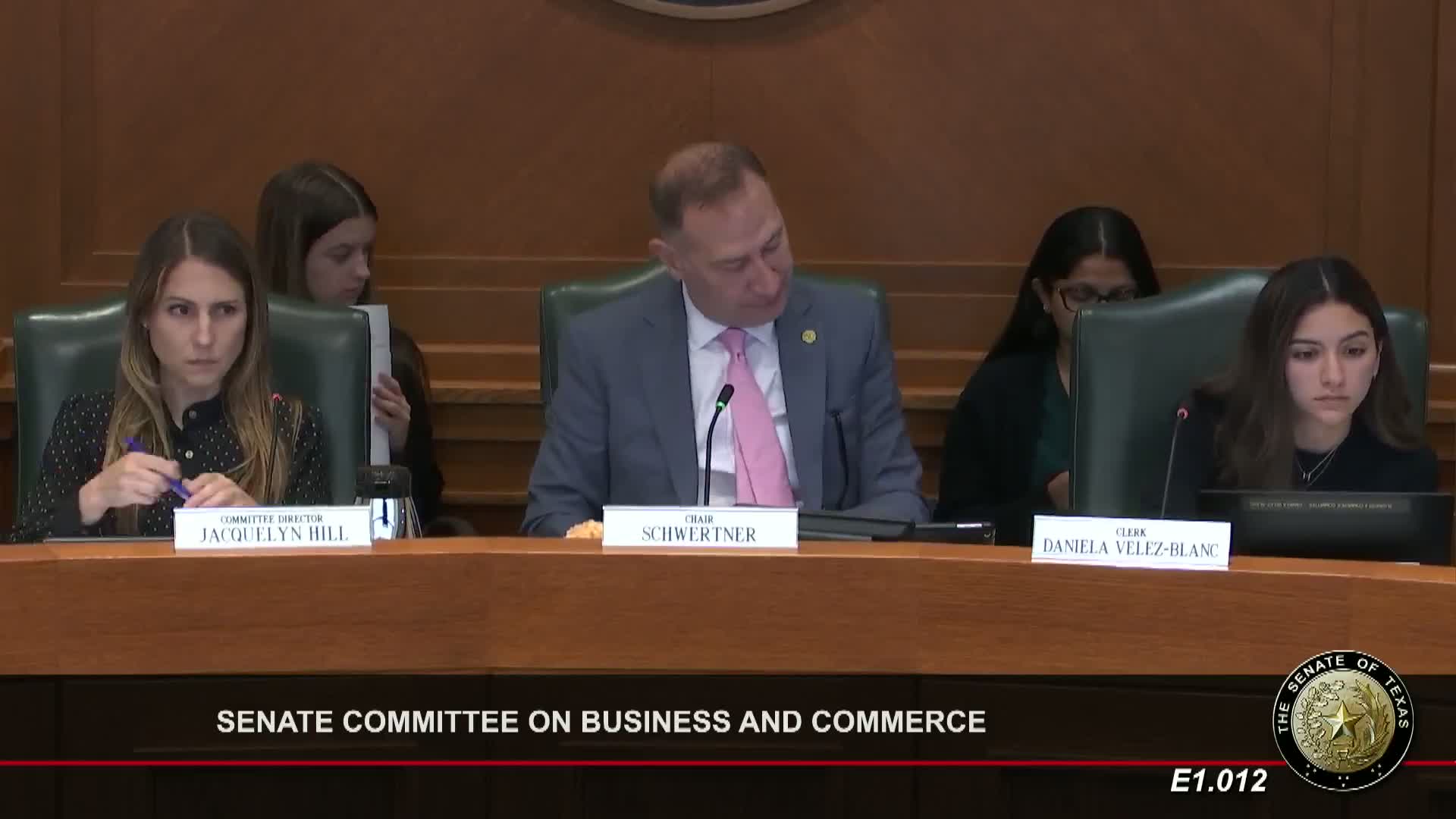Texas Senate Advances Bills on Solar Tile Regulation and Construction Defect Clarity
May 13, 2025 | Committee on Business & Commerce, Senate, Legislative, Texas
This article was created by AI summarizing key points discussed. AI makes mistakes, so for full details and context, please refer to the video of the full meeting. Please report any errors so we can fix them. Report an error »

The Senate Committee on Business and Commerce convened on May 13, 2025, to discuss several significant legislative proposals aimed at enhancing Texas's renewable energy framework and addressing construction industry challenges.
One of the key discussions centered around House Bill 431, which seeks to amend existing legislation to include solar tiles in the protections afforded to homeowners regarding solar energy installations. The bill aims to prevent homeowners associations from exploiting loopholes that could hinder Texans' efforts to reduce energy costs through solar technology. The committee emphasized that the same regulations that apply to traditional solar panels would now extend to solar tiles, ensuring broader access to renewable energy options for homeowners.
Another important bill, House Bill 3228, addresses the recycling and disposal of wind turbine blades and other components from renewable energy facilities. Senator Perry highlighted the need for financial assurance to ensure that resources are available for proper recycling, especially in light of past failures of recycling companies. The bill aims to establish requirements for wind and solar providers to secure financial resources through lease agreements, ensuring that landowners are not left with the burden of disposal if a company goes bankrupt.
House Bill 3229 builds on this initiative by mandating that recycling companies demonstrate financial solvency, requiring them to maintain a letter of credit or bond to guarantee their ability to fulfill disposal obligations. This measure aims to close gaps in accountability and ensure that the lifecycle of renewable energy components is managed responsibly.
Additionally, House Bill 1922 was introduced to clarify the accrual date for defect claims under Texas's right to repair statute. This bill seeks to eliminate ambiguity that has led to inconsistent interpretations and increased litigation costs for contractors and property owners. By establishing a uniform start date for claims, the bill aims to facilitate a fairer and more efficient resolution process for construction defects.
The committee opened the floor for public testimony, receiving support for these bills from various stakeholders, including environmental advocates and construction industry representatives. The discussions highlighted a collective effort to enhance Texas's renewable energy landscape while ensuring accountability and fairness in the construction sector.
As the committee concluded its session, all proposed bills were left pending, signaling ongoing deliberation and the potential for further refinement before advancing to the full Senate for consideration.
One of the key discussions centered around House Bill 431, which seeks to amend existing legislation to include solar tiles in the protections afforded to homeowners regarding solar energy installations. The bill aims to prevent homeowners associations from exploiting loopholes that could hinder Texans' efforts to reduce energy costs through solar technology. The committee emphasized that the same regulations that apply to traditional solar panels would now extend to solar tiles, ensuring broader access to renewable energy options for homeowners.
Another important bill, House Bill 3228, addresses the recycling and disposal of wind turbine blades and other components from renewable energy facilities. Senator Perry highlighted the need for financial assurance to ensure that resources are available for proper recycling, especially in light of past failures of recycling companies. The bill aims to establish requirements for wind and solar providers to secure financial resources through lease agreements, ensuring that landowners are not left with the burden of disposal if a company goes bankrupt.
House Bill 3229 builds on this initiative by mandating that recycling companies demonstrate financial solvency, requiring them to maintain a letter of credit or bond to guarantee their ability to fulfill disposal obligations. This measure aims to close gaps in accountability and ensure that the lifecycle of renewable energy components is managed responsibly.
Additionally, House Bill 1922 was introduced to clarify the accrual date for defect claims under Texas's right to repair statute. This bill seeks to eliminate ambiguity that has led to inconsistent interpretations and increased litigation costs for contractors and property owners. By establishing a uniform start date for claims, the bill aims to facilitate a fairer and more efficient resolution process for construction defects.
The committee opened the floor for public testimony, receiving support for these bills from various stakeholders, including environmental advocates and construction industry representatives. The discussions highlighted a collective effort to enhance Texas's renewable energy landscape while ensuring accountability and fairness in the construction sector.
As the committee concluded its session, all proposed bills were left pending, signaling ongoing deliberation and the potential for further refinement before advancing to the full Senate for consideration.
View full meeting
This article is based on a recent meeting—watch the full video and explore the complete transcript for deeper insights into the discussion.
View full meeting
